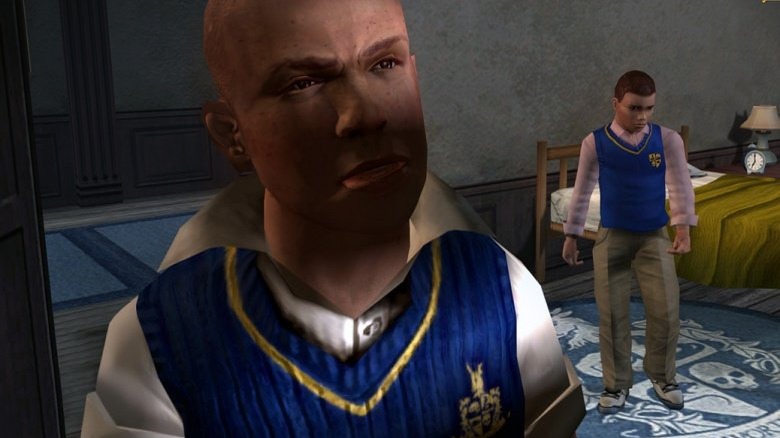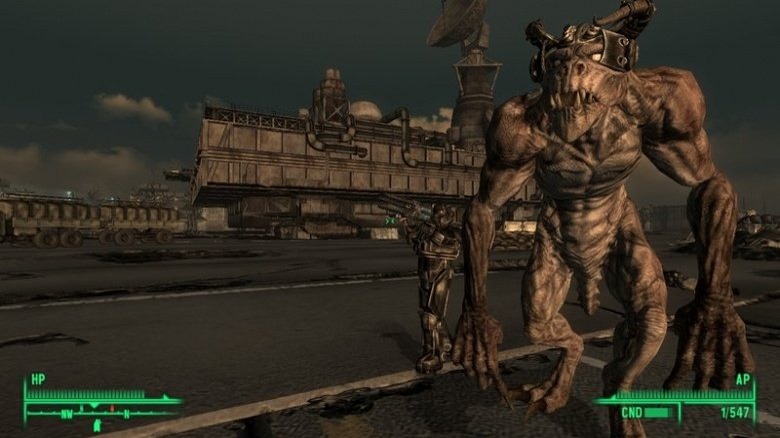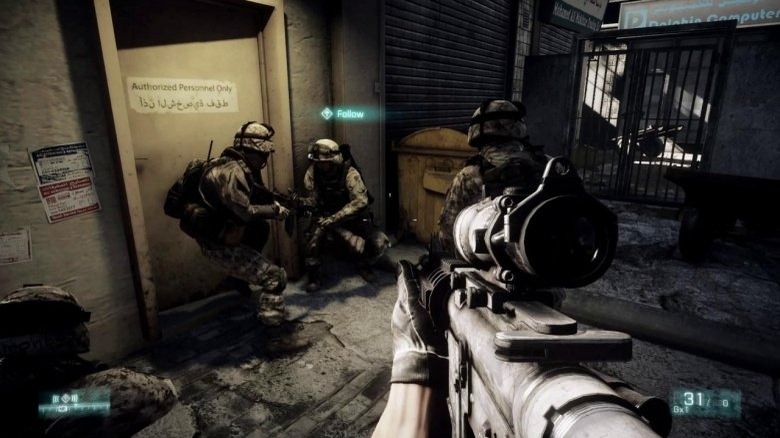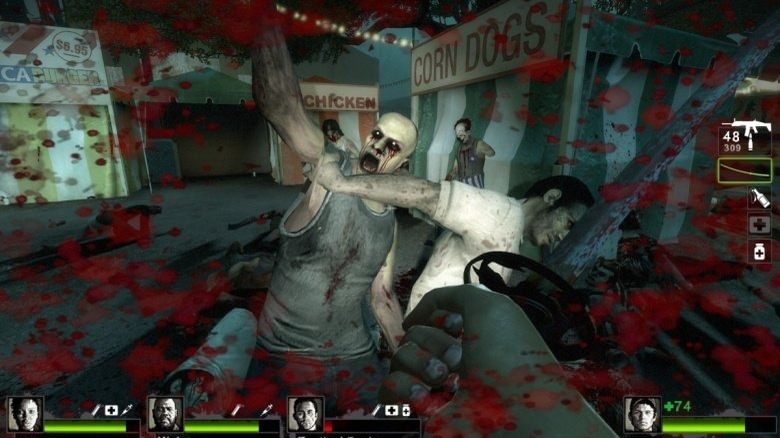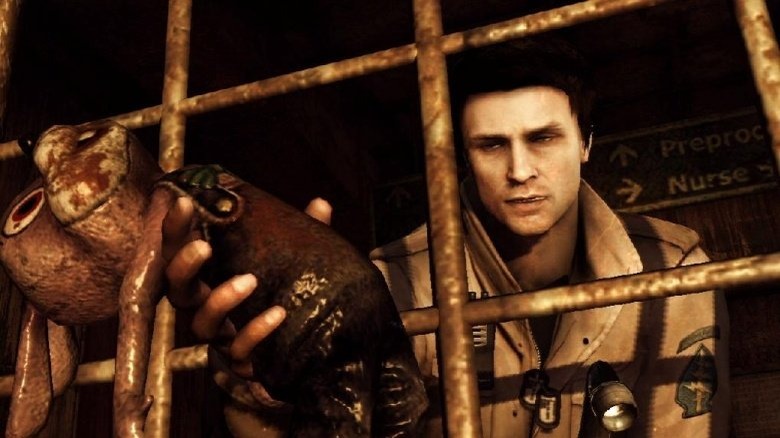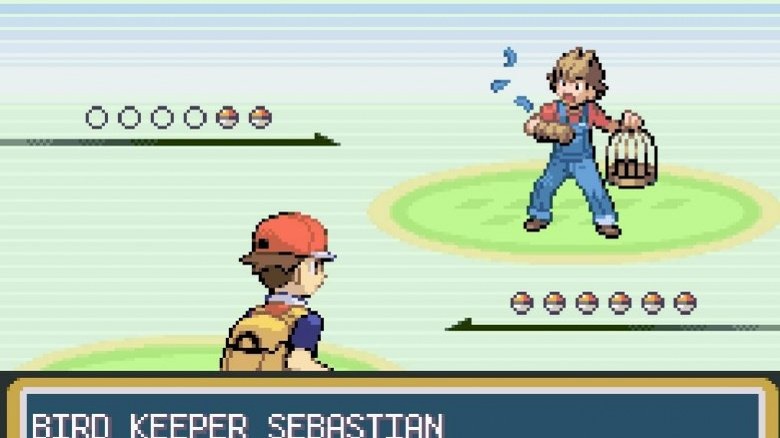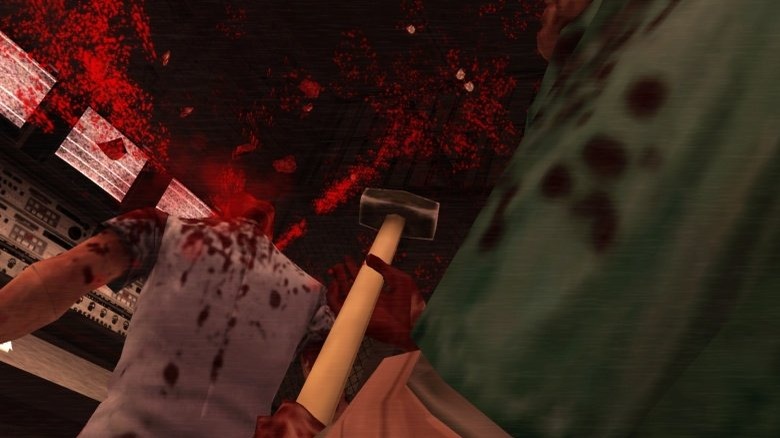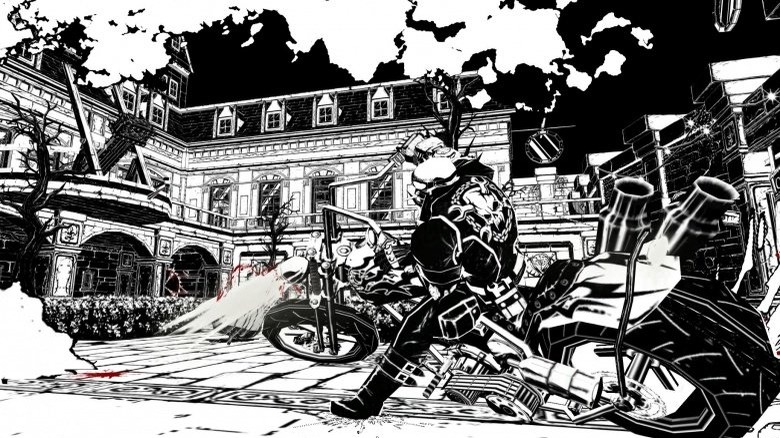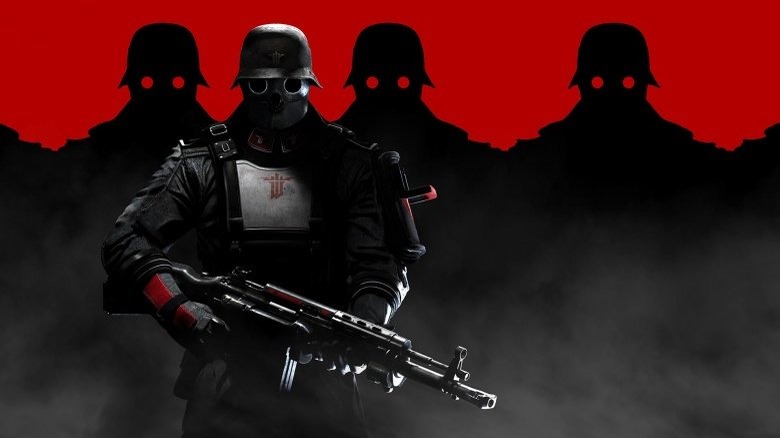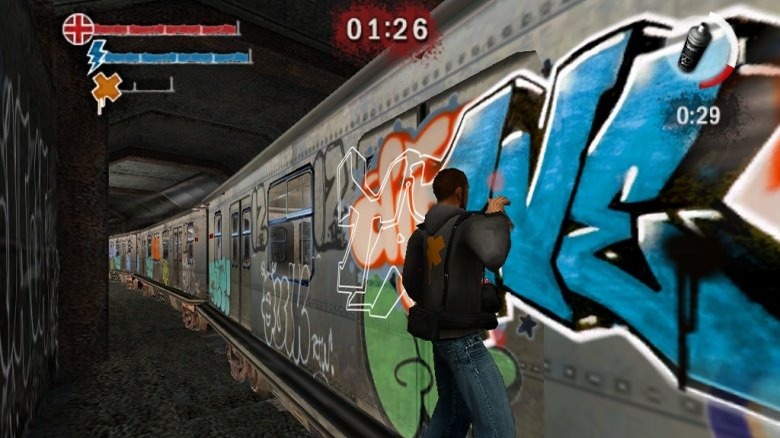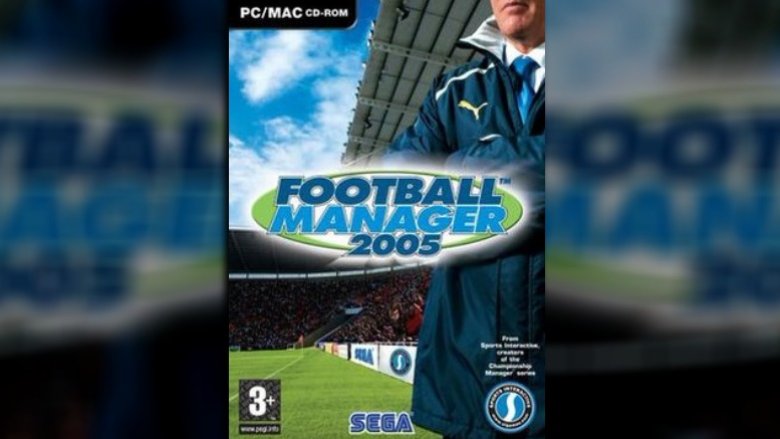Video Games That Are Banned Around The World
Video games tend to have at least a little bit of violence — that's just how it's been since we first figured out how to arm pixels with swords and BFGs. That, coupled with their growing popularity and influence, has made them incredibly controversial. While public outcry might lead to nothing more than a warning label and some publicity in some countries, others have banned titles in their entirety.
Bully
Bully (also called Canis Canem Edit, or Dog Eat Dog, in the European market) is Rockstar Games' take on bullying in schools. The player controls Jimmy, a 15-year-old student who has to navigate his way through the social networks of his school. Based on that description alone, it's a clear disaster, right? You play as a bully and gain a level every time you swirlie some poor nerd, right? Not so fast. Even though it was condemned by infamous anti-game-crusader Jack Thompson, it has some pretty powerful supporters, including Bullies2Buddies, an organization that teaches kids how to deal with bullies by utilizing the Golden Rule.
That's because, as anyone who actually bothered to play Bully would know, it has less to do with being a bully, and more to do with uniting the factions of students. Jimmy is rewarded for helping factions complete side quests, and he's punished for things like staying out past curfew and picking on girls. There's no guns, the only violence is fistfights, and if you continue to try to break the rules, you'll find yourself mowing lawns. That wasn't enough to keep Bully from being banned completely in Brazil, however. Major retailers in the UK also pulled it off shelves, even as they released statements that they would continue to stock other Rockstar titles ... including Grand Theft Auto, the "heroes" of which are more bullyish than poor Jimmy could ever hope to be.
Fallout 3
The idea of a world without Fallout? We don't like that. Not one bit. But that's exactly what Australia was facing when Bethesda's Fallout 3 was slapped with a nationwide ban.
It's surprising for a country renowned for its seemingly endless wildlife that wants to kill you, but Australia has some pretty draconian laws about violent video games. For a long time, the strictest rating a game could be given was MA15+, which means it's been found suitable for anyone 15 and older. Anything that doesn't meet the criteria doesn't get rated, and that means it doesn't get sold. Fallout 3 went unrated, because of its chems being deemed as references to drug use. So, shoot a Deathclaw in the face while it's making a good attempt at pulling your intestines out through your ears? Perfectly fine. Want to jab some Med-X in your arm beforehand, or shoot up with a Stimpak afterwards? Not so fast.
It wasn't just the drugs that were the issue — it was how they were presented. See, not only did Fallout 3's chems look like real drugs, but they had positive and negative qualities and were addictive. Bethesda went back to the drawing board and fictionalized their chems enough to get an MA15+ rating, and an unbanning.
Mass Effect
Singapore is definitely not down with girl-on-girl action in a video game. Or, for that matter, human female on female-looking mono-gender alien action. NSFW? Not the most LGBT-friendly country in the world, Singapore banned BioWare's Mass Effect for allowing players to trigger a love scene between a female human — if the player has chosen to play as a female Commander Shepard — and a female-looking alien. Officially, the Board of Film Censors stated that due to "a scene of lesbian intimacy ... the game has been disallowed."
But is it really a scene of lesbian intimacy? The problem is, the feminine alien in question is actually an Asari, which is technically an alien race with only one gender. It's hard to say what label or classification of love should be attached to this potential romantic encounter. Gamers in Singapore didn't love being the only ones in the world unable to play the much-anticipated RPG. The board ultimately reversed its decision and unbanned the game but slapped it with an M-18 movie-rating and announced plans to create a rating system for video games. Look, the sex scenes in the Mass Effect series are definitely cringey, but they're a few relay jumps from ban-worthy.
Battlefield 3
Battlefield 3 includes a major assault on Tehran, the capital of Iran. Needless to say, that didn't go over well with the powers-that-be in Iran, and the game was banned. Newspapers like the Lebanon Daily Star reported that authorities were taking the ban very, very seriously. Stores that sold games were raided, copies were seized, and there were even reports of people being arrested just for having copies of it. The FARS news agency claimed that the game's fictional US-Iranian conflict did nothing more than increase hostilities and fears that were already present, and online petitions gathered thousands of signatures.
EA, the giant behind the juggernaut, released their own statement regarding the ban, and it can best be summed up in a single word: "Cool." See, Battlefield 3 was never actually, legitimately released in Iran, and EA has no distributors or direct retailers in the country. The copies that were seized by authorities were all pirated, meaning the ban was actually cracking down on the same people who have been a thorn in the gaming industry's side since its inception. Cool, indeed.
EverQuest
When you think of "subverting public order," do you think of nearly 20-year-old MMORPGs? Probably not.
Put into effect in 2008 according to AFP, Brazil banned the sale of Sony Online Entertainment's EverQuest on the grounds that it encouraged "the subversion of public order" and served as an attack against the democratic state, the rule of law, and public security. And just to be clear, we are talking about the incredibly successful high-fantasy MMORPG — released in 1999 — where users can play as bards, paladins, wizards, and druids while exploring magical lands and varying planes of existence. That includes the Plane of Knowledge, in which all races and classes exist in harmony. (Right ... that's what messed up Brazil's uber-corrupt government.)
Brazilian EverQuest fans need not feel singled out, however. The sale of Counter-Strike was also banned for the same reasons. One is a first-person shooter with terrorists and the other has a busty high elf princess named Firiona Vie. Neither seems particularly democracy-destroying. But the best part of the banning of these games is the fact you're still technically allowed to play them. You just can't sell them. Because it's the act of selling games that destroys a free society, of course.
Left 4 Dead 2
Left 4 Dead 2 wasn't strictly banned in Australia — not in those terms, at least. But it wasn't available for five years after its initial release, and the slope it had to slide down was a slippery one, indeed.
When the co-op zombie FPS was released, it joined the queue for Australia's ratings board, and it, like Fallout 3 before it, found itself unrated and thus unsold. According to the review board, the amount of graphic violence was the sticking point on the zombie shoot-em-up-and-survive epic. They didn't like blood, gore, dismemberment, and the overall graphic nature, which we suppose usually goes hand-in-hand with hungry, murderous zombies. Specifically stated as problematic were the blood sprays and intestines, though not everyone was anti-intestine. Some members of the board argued they were actually integral parts of gameplay, and needed to be there. Those people had real ... intestinal fortitude. (We're so sorry.)
At the time, Australia was reevaluating their ratings system. Once the new ratings took effect, Valve put the game in front of the review board again, in all its gory, bloody, and uncensored glory. It passed (sort of), and was tagged with an R18+ rating. Finally, Australians could go zombie-hunting with legal copies of the game, and all they needed to do was be mature.
Silent Hill: Homecoming
Right. When we started this piece, we didn't expect to see Australia popping up so often. We're disappointed in you, Australia.
Silent Hill: Homecoming fell to the censors in 2008, when review boards took issue with the graphic nature of the game. Citing things like extreme violence and blood spray to fight scenes and torture scenes, Homecoming was slapped by the ban stick, instead of the MA15+ rating that previous games in the series got. Some specific scenes were mentioned, but it was using a drill as a weapon that the Aussies had a particular problem with. That, along with images of dismembered corpses and gore, took the latest installment of one of the creepiest game series in history off Australian shelves.
The series has always had its controversial bits, right back to the release of the first one in 1999. Back then, it was the Grey Children that bothered censors outside of the US, and the creepy, knife-toting kids were replaced to keep the game from being banned or restricted.
Pokemon
Pokemon hasn't had a good run in Saudi Arabia, starting when it was first banned in 2001 for a whole bunch of reasons. Since the game involved card-trading, one of the claims made against it was that it didn't just promote gambling, it targeted kids while doing so. Saudi authorities also claimed that some of the symbols found on the cards, and in the game, were reminiscent of Islamic religious symbols, and that was obviously not cool. (Nintendo denied any connection.) It was also claimed that not only was the game clearly a bad influence when it hit the market in 1996, but it promoted Zionism, blasphemy, and all different sorts of strictly off-limit things.
When Pokemon Go took the world by storm in 2016, religious officials extended the ban by issuing a fatwa against the app. According to the updated ruling, Pokemon Go was a no-go because of its use of evolution to grow its characters. Evolution has absolutely been discredited by Islam, and the theories of Darwin were just one more thing that the game was supposedly teaching impressionable young children about. Also, Saudi officials issued warnings about the use of GPS trackers to pinpoint the location of players. The Saudi government doesn't want random people spying on each other — that's their job.
Manhunt and Manhunt 2
In 2004, Rockstar's Manhunt received the dubious honor of being blamed for the tragic death of a 14-year-old boy in England. Stefan Pakeerah was beaten to death with a hammer by a 17-year-old friend who was reportedly obsessed with the game. Stefan's mother launched a crusade against Manhunt, and it was pulled from shelves across the country.
When Manhunt 2 came out three years later, the UK didn't wait for another death, and banned it altogether. Those in on the decision cited the game's endlessly bleak tone, and unrelenting gore and violence seemingly for the sake of gore and violence. The UK was joined by Ireland, who made Manhunt 2 the first video game ever banned in the Emerald Isle. They cited things like casual sadism, unrelenting violence, and torture as their reasons for banning the game. This was all in spite of Rockstar's insistence that they were only marketing the game toward mature adults. You know, the sort of people that enjoy that kind of thing.
Mad World
The writer of Wii's Mad World has said that the game was born from a very particular challenge. He wanted to write a character at home in a straight-up, down-and-dirty, punch-them-in-the-face-and-rip-out-their-spine sort of bloodbath, but also wanted to make sure he wasn't glorifying violence. The solution was to set the game within a game, where you played a character competing in a game called "DeathWatch."
Not surprisingly, a game where people hunted each other for the entertainment of the upper class got the unwanted attention of people who weren't thrilled enough with the message (blood sports are bad) to forgive the delivery system (a Bloodbath Challenge). Mad World was banned in Germany, and it saw a delayed release in Japan while critics and supporters argued over a game where killing people in the bloodiest way possible was exactly how you got points. The UK hit it with a mature rating, against the advice of media watchdogs who wanted it banned completely.
Even in the US, campaigners asked for a ban. Part of the problem was the platform it was played on, as the game seemed to deliver every rude gesture and raspberry in the book to the Wii's family-friendly image. Mario stomping on mushroom heads while cheerfully yipping and yahoo'ing? Totally family-friendly. Blowing people to bits with fireworks? Not so much.
Wolfenstein
Castle Wolfenstein first came out in 1981, and since then it's spawned a series of sequels. The basic idea behind the games is Hero vs. Nazis, and that obviously hasn't sat well with Germany, but for the reason you might think. Germany outright bans most Nazi imagery, even when they're clearly the bad guys. That ban includes video games, as they fall into a "toy" category, but Wolfenstein's publisher was willing to jump through some major hoops to get Germany's booming game market on board with the old favorite.
Wolfenstein was finally released in Germany in 2014, but only because Bethesda did some major alterations to the game for the German market. Nazis became the Regime, symbols were changed, and they made damn sure to geo-lock the Nazi version of the game to keep it from making it to both Germany and Austria. That version of the game is still banned, and expect it to be forever.
Marc Ecko's Getting Up: Contents Under Pressure
Seriously, Australia. Your country's gamers need to sit down and have an open and honest chat with you about why you ban almost everything. Marc Ecko's Getting Up: Contents Under Pressure was released in 2006, and it's something of a departure from the blood, drugs, and gore that Australia usually seems to focus on. The game tells the story of a graffiti artist named Trane, who has decided to take his art to the streets in a protest against a corrupt government.
You can probably see where this is going. The game was originally given an MA15+ rating, but it wasn't long before that was appealed. When it went before the OLFC review board, it got slapped with an outright ban. The board claimed that, not only was the game giving gamers tips on how to become a real graffiti artist, but it was encouraging them to do exactly that. Included in the game were bios of real-world artists, and the board took particular issue with references to their illegal tagging activities.
Atari didn't take the ban lightly, comparing the censorship of video games to history's book burnings. Which, while we get it, seems just a trifle extreme. Australia stood fast, saying they couldn't condone or allow a game they saw as an instruction manual for criminal activity.
Football Manager 2005
You might not know much about the Football Manager series, but your one British friend can probably bore you to death with tales of staying up all night, making shrewd signings, and taking Middlesbrough F.C. to Champions League glory. Unlike other soccer games, in Football Manager you literally — as the name implies — manage a football club. We're talking about reading emails, analyzing financial spreadsheets, dealing with player training, and all the other boring parts you usually simulate in FIFA. And yet, the 2005 version of this game somehow managed to go and get itself banned.
The Ministry of Culture in China decided this management sim wasn't going to wreak any havoc and banned the game on the grounds that it posed "harm to the country's sovereignty and territorial integrity." You see, Football Manager 2005 had the audacity to recognize Taipei of Taiwan, the Hong Kong-Macao region, and Tibet as independent countries — a fact China found very uncool.
Getting your hands on an illegal copy was certainly nothing to joke about. The Ministry of Culture ordered an investigation into the illegal dissemination of the game and levied fines up to $3,600 on those caught distributing the game. Business licenses could also be revoked, and internet service providers who failed to prevent the downloading or installation of the game risked being shut down for good. Chinese gamers weren't happy, and the Ministry reported "strong protests." FOOTBALL MANAGER! FOOTBALL MANAGER!
Call of Duty: Black Ops II
The All Pakistan CD, DVD, Audio Cassette Traders and Manufacturers Association — perhaps most widely known by its incredibly easy-to-remember acronym APCDACTM — banned the sale of Call of Duty: Black Ops II from within the country's borders, on the grounds that the game portrayed Pakistan in a bad light.
As translated by Fox News, APCDACTM's official statement claims "The Association has always boycotted these types of films and games" as they "have been developed against the country's national unity and sanctity." Furthermore, Black Ops II and Medal of Honor: Warfighter were allegedly "developed against Pakistan, and The Association has completely banned their sale." An anonymous Pakistani security official even told Fox that the games were developed as part of "psychological warfare," claiming the games "are an effort to malign the minds of youth against Pakistan" and make Americans feel okay about killing Pakistanis.
Now, while it's no secret to industry insiders that Treyarch and Activision put their anti-Pakistan agenda second only to making boatloads of cash, claiming the games are actually weapons in a psychological war is a bit strong. Perhaps the best part about the whole thing is that, despite the country's best efforts, the games were still readily available. Moeen Ali, owner of Islamabad's largest game store, told Fox that Black Ops II was a top seller, and that he didn't even know about the ban! Suuuure you didn't, Moeen Ali.
